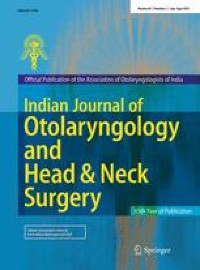|
Anapafseos 5 Agios Nikolaos 72100,Crete,Greece,00302841026182,00306932607174,alsfakia@gmail.com
Blog Archive
- ► 2022 (3010)
-
▼
2021
(9899)
-
▼
July
(937)
-
▼
Jul 11
(74)
- The cost of cure: Examining objective and subjecti...
- Otolaryngologists Trail Other Specialties in Indus...
- Second Primary Tumors in Patients Presenting With ...
- Cell‐Free Human Papillomavirus‐DNA for Monitoring ...
- Novel Multidisciplinary Salivary Gland Society (MS...
- Improving the Pediatric Floor Discharge Process Fo...
- MicroRNA‐215‐5p inhibits the proliferation of kera...
- Treatment of axillary bromhidrosis in adolescents ...
- Endoscope Assisted Combined Drainage of Sino-Orbit...
- Role of Octreotide in Conservative Management of C...
- A Review on Esthesioneuroblastoma
- Sonlicromanol’s active metabolite KH176m normalize...
- Metastatic Papillary Thyroid Cancer to the Liver: ...
- Association of CD4 T cell count and optimal timing...
- Wnt7a promotes muscle regeneration in branchiomeri...
- Uniformly-aligned gelatin/polycaprolactone fibers ...
- Effects of different intensity of exercise on tiss...
- miR-27a acts as an oncogene to regulate endometria...
- Tracking bacterial DNA patterns in septic progress...
- In vitro fertilization is associated with placenta...
- A new flexible pressure sensor contributes to the ...
- Pelvic cavity malignant solitary fibrous tumor wit...
- Locally aggressive orbital giant cell reparative g...
- Association of single-nucleotide polymorphism on c...
- Sequential occurrence of different subtypes of non...
- Survival analysis of recurrent squamous cell carci...
- Effects of interventional therapy on AQP4 gene exp...
- Cholesterol granuloma mimicking ovarian cancer
- Effect of Otolaryngology Residency Program Trainin...
- Myoepithelioma of the Parotid Gland: A Case Report...
- Low Antioxidant Enzyme Levels and Oxidative Stress...
- Urinary iodine concentration and radioactive iodin...
- Dynamic sleep MRI in obstructive sleep apnea: a sy...
- The evaluation of superior semicircular canal bone...
- Blocking the Thyrotropin Receptor with K1-70 in a ...
- A pragmatic window of opportunity to minimise the ...
- Sites of invasion of cancer of the external audito...
- Glutamine for prevention and alleviation of radiat...
- Sudden Sensorineural Hearing Loss Post Coronavirus...
- Estimation of Chest Wall Attenuation of the Emissi...
- Radioiodine Imaging and Treatment in Thyroid Disor...
- Comparison of the Healing Effect of Nasal Saline I...
- Effect of Adenotonsillectomy on Peak Expiratory Fl...
- Is Early Cochlear Implantation Leads to Better Spe...
- Characterization of Dermatoglyphic Profiles and it...
- Immediate Effects of Semi-occluded Vocal Tract Exe...
- 3D Printed Larynx as a Novel Simulation Tool for W...
- Alveolar bone grafting and gingivoperiosteoplasty ...
- Abdominal-based free flaps in head and neck recons...
- Management of facial burns: an update
- Facial paralysis: timing of repair and management ...
- Surgical management of the orbit in thyroid eye di...
- The history of nasal reconstruction
- Management of dermatofibrosarcoma protuberans
- Seeing through the evidence for corneal neurotization
- Prevention and management of oronasal fistulas
- Subdorsal Z-flap: a modification of the Cottle tec...
- Postoperative pain management in pediatric cleft l...
- Resurgence of regional flaps for head and neck rec...
- Management of noncleft velopharyngeal insufficiency
- Distraction osteogenesis in craniosynostosis
- Botulinum toxin type a intralesional monotherapy f...
- Three-dimensional morphologic classifications and ...
- A comprehensive morphometric analysis of crista ga...
- Acoustic Voice Analysis of Normal and Pathological...
- Sentinel lymph node biopsy versus elective neck di...
- Pretherapeutic Predictive Factors for Histological...
- Auditory Event Related Potentials in children with...
- Diagnostic Usefulness of Flexible Fibroscopy Biops...
- An eclectic Voice Therapy Program for the Treatmen...
- Plasma Asymmetrıc Dımethylargınıne (ADMA) and Nıtr...
- Human immunodeficiency virus and lymphoma
- Preoperative versus postoperative radiotherapy in ...
- Cutaneous complications following hematopoietic st...
-
▼
Jul 11
(74)
-
▼
July
(937)
- ► 2020 (4138)
- ► 2019 (2429)
Αλέξανδρος Γ. Σφακιανάκης
Sunday, July 11, 2021
Role of Octreotide in Conservative Management of Chyle Leak Post Neck Dissection in Cases of Head Neck Cancer: A Retrospective Analysis
Subscribe to:
Post Comments (Atom)



No comments:
Post a Comment